初中英语常见常考易混词用法辨析
初中英语易混词、短语辨析
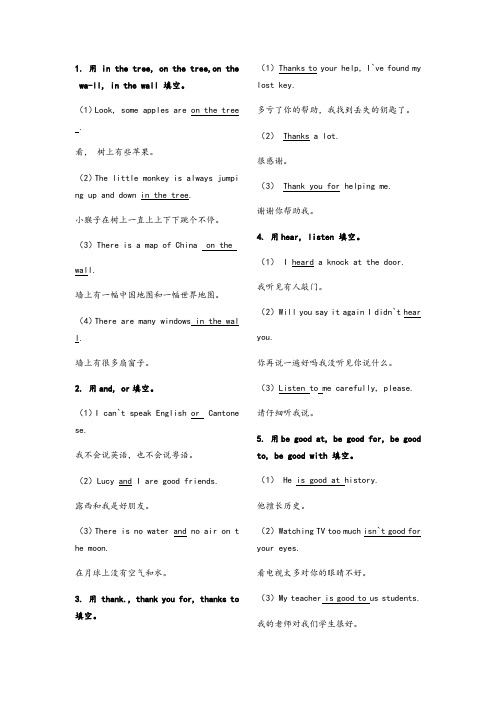
1. 用 in the tree, on the tree,on the wa-ll, in the wall 填空。
(1)Look, some apples are on the tree .看,树上有些苹果。
(2)The little monkey is always jumpi ng up and down in the tree.小猴子在树上一直上上下下跳个不停。
(3)There is a map of China on thewall.墙上有一幅中国地图和一幅世界地图。
(4)There are many windows in the wal l.墙上有很多扇窗子。
2. 用and, or填空。
(1)I can`t speak English or Cantone se.我不会说英语,也不会说粤语。
(2)Lucy and I are good friends.露西和我是好朋友。
(3)There is no water and no air on t he moon.在月球上没有空气和水。
3. 用 thank., thank you for, thanks to 填空。
(1)Thanks to your help, I`ve found my lost key.多亏了你的帮助,我找到丢失的钥匙了。
(2) Thanks a lot.很感谢。
(3) Thank you for helping me.谢谢你帮助我。
4. 用hear, listen 填空。
(1) I heard a knock at the door.我听见有人敲门。
(2)Will you say it again I didn`t hearyou.你再说一遍好吗我没听见你说什么。
(3)Listen to me carefully, please.请仔细听我说。
5. 用be good at, be good for, be good to, be good with 填空。
初中英语易混淆副词
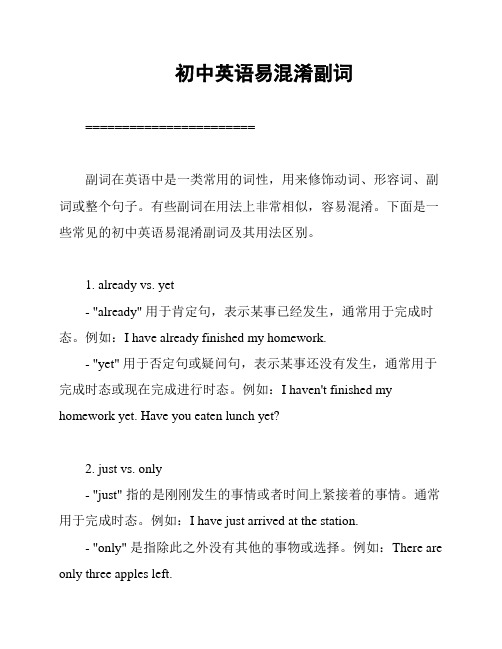
初中英语易混淆副词=======================副词在英语中是一类常用的词性,用来修饰动词、形容词、副词或整个句子。
有些副词在用法上非常相似,容易混淆。
下面是一些常见的初中英语易混淆副词及其用法区别。
1. already vs. yet- "already" 用于肯定句,表示某事已经发生,通常用于完成时态。
例如:I have already finished my homework.- "yet" 用于否定句或疑问句,表示某事还没有发生,通常用于完成时态或现在完成进行时态。
例如:I haven't finished my homework yet. Have you eaten lunch yet?2. just vs. only- "just" 指的是刚刚发生的事情或者时间上紧接着的事情。
通常用于完成时态。
例如:I have just arrived at the station.- "only" 是指除此之外没有其他的事物或选择。
例如:There are only three apples left.3. already vs. still- "already" 表示某事已经发生,并且常常用于否定句或疑问句。
例如:She has already left.- "still" 表示某事持续存在,常用于肯定句中。
例如:He is still studying for the exam.4. usually vs. often- "usually" 表示某事或情况在通常情况下发生,并不表示频率。
例如:I usually go to bed at 10 pm.- "often" 用于表示频率较高的情况。
例如:She often helps her classmates with their homework.5. enough vs. too- "enough" 表示满足要求或需要,强调达到某个水平。
初中英语中考常用介词短语和易混易错词组
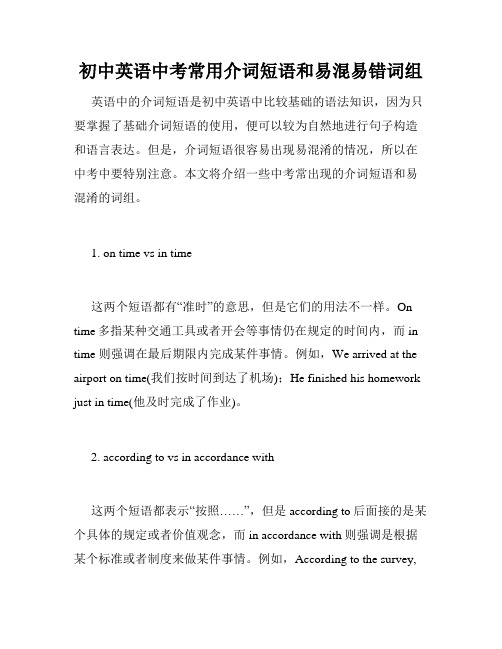
初中英语中考常用介词短语和易混易错词组英语中的介词短语是初中英语中比较基础的语法知识,因为只要掌握了基础介词短语的使用,便可以较为自然地进行句子构造和语言表达。
但是,介词短语很容易出现易混淆的情况,所以在中考中要特别注意。
本文将介绍一些中考常出现的介词短语和易混淆的词组。
1. on time vs in time这两个短语都有“准时”的意思,但是它们的用法不一样。
On time多指某种交通工具或者开会等事情仍在规定的时间内,而in time 则强调在最后期限内完成某件事情。
例如,We arrived at the airport on time(我们按时间到达了机场);He finished his homework just in time(他及时完成了作业)。
2. according to vs in accordance with这两个短语都表示“按照……”,但是according to后面接的是某个具体的规定或者价值观念,而in accordance with则强调是根据某个标准或者制度来做某件事情。
例如,According to the survey,more and more people prefer to work from home(根据调查,越来越多的人喜欢在家工作); In accordance with company regulations, smokers may only smoke in designated areas(根据公司规定,吸烟者只能在指定区域吸烟)。
3. in spite of vs despite这两个短语都表示“尽管”,但in spite of通常用来表示困难或者阻力,而despite则强调不受阻碍的情况。
例如,In spite of the heavy rain, we still went hiking(尽管下着大雨,我们还是去远足了);Despite the fact that he was tired, he continued to work(尽管很累,他还是继续工作)。
初中英语中常见的易混知识点

初中英语中常见的易混知识点易混知识点在初中英语学习中是常见的,因为它们经常会让学生感到困惑。
这些易混知识点涉及语法、词汇和说法等方面。
在本文中,我将列举一些常见的易混知识点并解释它们的区别,以帮助初中生更好地理解和应用它们。
一、a, an和thea和an都是不定冠词,表示单数不特指的人或物。
a用于以辅音音素开头的单词前,而an用于以元音音素开头的单词前。
例如,a book(一本书)和an apple (一个苹果)。
在此之后,我们使用定冠词the来指代特定的人或物。
例如,the book on the table(桌子上的那本书)。
二、there, their和they'rethere是副词,用于指示某处的位置。
例如,There is a cat in the garden(花园里有只猫)。
their是形容词,表示归属关系,意思是“他们的”。
例如,Their house is big(他们的房子很大)。
they're是they are的缩写形式,意思是“他们是”。
例如,They're my friends(他们是我的朋友)。
三、too, two和totoo是副词,意思是“也”,用于表示程度或数量过高。
例如,I am too tired to go (我太累了,无法去)。
two是数字2。
to是介词,用于表示方向、目的或比较。
例如,He went to the store(他去了商店)。
四、its和it'sits是形容词,表示归属关系,意思是“它的”。
例如,The cat licked its paws(猫舔了它的爪子)。
it's是it is的缩写形式,意思是“它是”。
例如,It's a beautiful day (今天是个美好的日子)。
五、your和you'reyour是形容词,表示归属关系,意思是“你的”。
例如,Is this your book?(这是你的书吗?)。
38个初中易混单词及短语的用法及区别
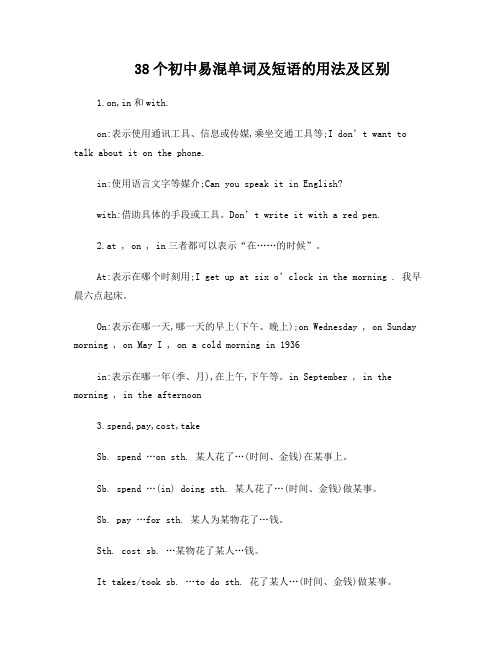
38个初中易混单词及短语的用法及区别1.on,in和with.on:表示使用通讯工具、信息或传媒,乘坐交通工具等;I don’t want to talk about it on the phone.in:使用语言文字等媒介;Can you speak it in English?with:借助具体的手段或工具。
Don’t write it with a red pen.2.at , on , in三者都可以表示“在……的时候”。
At:表示在哪个时刻用;I get up at six o’clock in the morning . 我早晨六点起床。
On:表示在哪一天,哪一天的早上(下午、晚上);on Wednesday , on Sunday morning , on May I , on a cold morning in 1936in:表示在哪一年(季、月),在上午,下午等。
in September , in the morning , in the afternoon3.spend,pay,cost,takeSb. spend …on sth. 某人花了…(时间、金钱)在某事上。
Sb. spend …(in) doing sth. 某人花了…(时间、金钱)做某事。
Sb. pay …for sth. 某人为某物花了…钱。
Sth. cost sb. …某物花了某人…钱。
It takes/took sb. …to do sth. 花了某人…(时间、金钱)做某事。
4.too much, too many, much tootoo much + 不可数名词too many + 可数名词much too + 形容词5.not …until &untilnot …until 直到…才…(主句动词是短暂性动词)until 一直到…(主句中使用延续性动词)6.few, a few; little , a little. 虽然都表示“少”,但(1)few, a few是可数的, little, a little是不可数的。
初中英语易错易混辨析归纳

易错易混辨析1. a bit 与a little①在肯定句中,a bit=a little,意为“有点儿”,修饰形容词或副词。
另外,a little还可以修饰不可数名词,意为“一点儿”。
Your article is a bit/a little long.There is only a little food left.②在否定句中,not a bit=not at all,意为“毫不”;not a little =very,意为“非常”。
The old man says that he is not a bit tired but in fact he is not a little tired.2.about与on都表示“关于”①about表示的内容较为普通,不是特别正式。
A book about Lei Feng②on表示严肃的或学术的A book on African history.3.above,on与over在......之上①表示位置高于某物(反below)Our office is above the shop.②表示物体表面相接触(反beneath)There is a glass on the desk.③表示垂直的上方(反under)There is a lamp hanging over the desk.4.accept与receive①表示主观上接受②表示客观上收到The girl received a gift,but she didn’t accept it.例题.I didn’t mean to trouble Curry yesterday. It was pouring with rain so I his offer of a lift. A.refused B.received C.allowed D.accepted5.across,throug与over①across在某个平面穿过②through从立体空间里穿过③over从上方越过The Great Wall winds its way from west to east ,across the deserts,over the mountains,through the valleys,till at last it reaches the sea.例题.You must be careful when you swim the lake.A.acrossB. belowC.overD.through6.ago与before①ago表示从事情发生到现在过去了多久(和一般过去时连用)②before表示从事情发生到过去某个时间是多久(可以和过去时或完成时连用)A week ago I went to see him ,but his father said that he had left two weeks before.7.agree with ,agree to 与agree on①agree with指“同意某人或某人的意见、观点、决定、想法、安排、解释”等,其后可以是一个名词或人称代词,也可以是what引导的从句。
初中英语易混词辨析

初中英语易混词辨析enjoy,like,love,preferenjoy,like,love和prefer都可表达“喜爱”的意思,但含义和用法有所不同。
enjoy在意义上侧重于“享受某种乐趣”,后接名词或动名词作宾语,不能接不定式。
enjoy还可以与反身代词连用,即“enjoy oneself”,表示“玩得很高兴”(= have a good time)The man is enjoying his dinner. 那个男人正津津有味地吃饭。
My father enjoys listening to the radio. 我父亲爱听广播。
Did the children enjoy themselves in the park? 孩子们在公园里玩得愉快吗?like意为“喜欢、喜爱”,是一般用语,主要是指对某人或某物产生好感或发生兴趣,不带有感情色彩,后面可接名词、代词、动名词、动词不定式作宾语。
Everyone in China likes Mid-Autumn Day. 在中国,每个人都喜欢中秋节。
He likes his students to work hard. 他喜欢他的学生努力学习。
love表示“爱、热爱、爱戴”,有强烈的感情,相当于like…very much,侧重于对祖国及较亲近的人的深厚感情。
在口语中它往往又指一般的喜爱,这时与like的意思相近,可以互换。
后面也可以接名词、动名词或动词不定式。
We love our motherland. 我们热爱我们的祖国。
They love playing/to play basketball. 他们爱打篮球。
like和love都可与would,should连用,表示“愿意做某事”。
I’d like/love to go with you. 我愿意和你们一起去。
prefer意为“(比较)喜欢、宁愿”,相当于like…better,它的“喜欢”是带有选择性的,是在比较的情况下选择出来的,其后接名词、代词、动名词或不定式。
初中英语常见常考易混短语例解
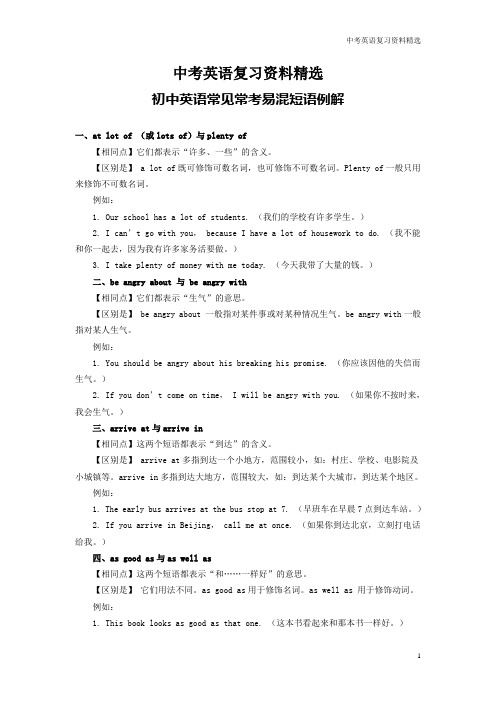
中考英语复习资料精选初中英语常见常考易混短语例解一、at lot of (或lots of)与plenty of【相同点】它们都表示“许多、一些”的含义。
【区别是】 a lot of既可修饰可数名词,也可修饰不可数名词。
Plenty of一般只用来修饰不可数名词。
例如:1. Our school has a lot of students. (我们的学校有许多学生。
)2. I can’t go with you, because I have a lot of housework to do. (我不能和你一起去,因为我有许多家务活要做。
)3. I take plenty of money with me today. (今天我带了大量的钱。
)二、be angry about 与 be angry with【相同点】它们都表示“生气”的意思。
【区别是】 be angry about 一般指对某件事或对某种情况生气。
be angry with一般指对某人生气。
例如:1. You should be angry about his breaking his promise. (你应该因他的失信而生气。
)2. If you don’t come on time, I will be angry with you. (如果你不按时来,我会生气。
)三、arrive at与arrive in【相同点】这两个短语都表示“到达”的含义。
【区别是】 arrive at多指到达一个小地方,范围较小,如:村庄、学校、电影院及小城镇等。
arrive in多指到达大地方,范围较大,如:到达某个大城市,到达某个地区。
例如:1. The early bus arrives at the bus stop at 7. (早班车在早晨7点到达车站。
)2. If you arrive in Beijing, call me at once. (如果你到达北京,立刻打电话给我。
初中英语易混淆知识点总结

初中英语易混淆知识点总结一、时态的混淆1. 一般现在时与现在进行时:一般现在时表示习惯性动作或普遍真理,而现在进行时则表示正在进行的动作。
例如,She always helpsothers(她总是帮助别人)与She is helping others now(她现在正在帮助别人)。
2. 一般过去时与过去进行时:一般过去时表示过去某一确定时间发生的动作,而过去进行时则强调过去某一时刻正在进行的动作。
例如,He walked to school yesterday(他昨天走路去学校)与He was walking to school this time yesterday(昨天这个时候他正在走路去学校)。
3. 现在完成时与现在完成进行时:现在完成时表示过去发生的动作对现在有影响,现在完成进行时则强调从过去某一时间开始一直持续到现在的动作。
例如,I have finished my homework(我已经完成了我的作业)与I have been working on my homework(我一直在做我的作业)。
二、介词的使用1. in, on, at:in用于表示在某个范围或区域内部,on表示在表面上,at表示某个点。
例如,在桌子上(on the table)、在公园里(in the park)、在五点钟(at 5 o'clock)。
2. to, for:to表示方向,目的地,for表示目的,受益方。
例如,I am going to the library(我要去图书馆)与I am buying a bookfor you(我为你买本书)。
三、冠词的误用1. the, a, an:定冠词the用于特指某个已知的人或物,不定冠词a/an用于泛指。
例如,The sun rises in the east(太阳从东方升起)是固定搭配,而A cat is a lovely pet(猫是一种可爱的宠物)则泛指任何一只猫。
易混动词辨析(初中英语专题复习)

易混动词辨析(初中英语专题复习)【易混辨析】【图解助记】cost /pay/ take /spend的区别:cost 的主语通常是事或物(包括形式主语it),不能是人;pay 的主语只能是人,常与for连用;spend 的主语也只能是人,构成spend on sth.或spend in doing sth.;take的主语常常是形式主语it。
如:The computer cost (me) $2000. 这台电脑花了(我) 2000 美元。
I have spent all day looking for you. 我花了一整天来找你。
It took him an hour to write the letter. 他写这封信花了一个小时。
She paid 10 yuan for this book. 她买这本书花了10元钱。
1.keep作及物动词,意为"使……保持(某种状态)"、"使得……"时,常用于以下几种结构:(1)keep+宾语(由人或物充当)+形容词。
Keep your hands clean. 手要保持干净。
(2)keep+宾语+副词。
What have kept you awa for so long? 什么事使你离开这么久?(3)keep+宾语+v-ing。
I’m sorry to have kept you waiting. 对不起,让你久等了。
(4)keep+宾语+v-ed。
Keep the door clsed. 让门关着。
(5)keep+宾语+介词短语。
Don’t keep your hands in your pockets. 不要把手插在口袋里。
2.keep作及物动词,后接名词作宾语,构成动宾结构,意为"保存"、"保留"、"记(日记等)"、"经营(商店等)"、"遵守(诺言等)"之意。
I keep a diary in English.我用英文记日记。
She keeps a bllkstore.她经营一家书店。
2022-2023学年中考英语常见易混单词短语用法辨析(三)
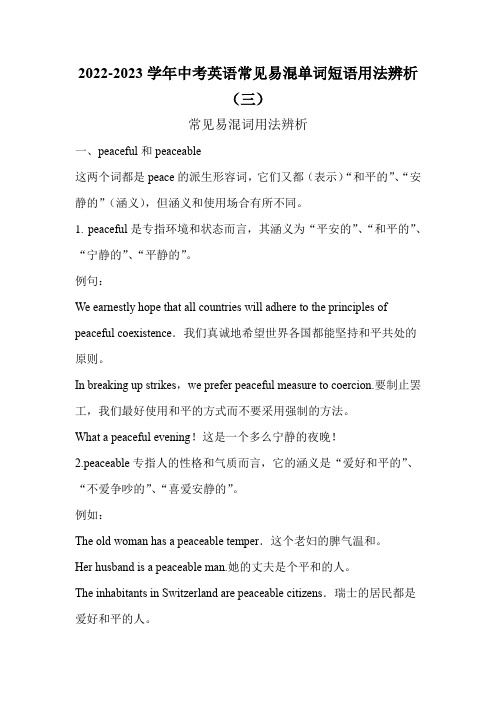
2022-2023学年中考英语常见易混单词短语用法辨析(三)常见易混词用法辨析一、peaceful和peaceable这两个词都是peace的派生形容词,它们又都(表示)“和平的”、“安静的”(涵义),但涵义和使用场合有所不同。
1.peaceful是专指环境和状态而言,其涵义为“平安的”、“和平的”、“宁静的”、“平静的”。
例句:We earnestly hope that all countries will adhere to the principles of peaceful coexistence.我们真诚地希望世界各国都能坚持和平共处的原则。
In breaking up strikes,we prefer peaceful measure to coercion.要制止罢工,我们最好使用和平的方式而不要采用强制的方法。
What a peaceful evening!这是一个多么宁静的夜晚!2.peaceable专指人的性格和气质而言,它的涵义是“爱好和平的”、“不爱争吵的”、“喜爱安静的”。
例如:The old woman has a peaceable temper.这个老妇的脾气温和。
Her husband is a peaceable man.她的丈夫是个平和的人。
The inhabitants in Switzerland are peaceable citizens.瑞士的居民都是爱好和平的人。
二、out of question和out of the question这一对片语仅差一字之微,涵义却大相径庭。
1.out of question的意思是“毫无疑问”,它是副词性短语,修饰谓语动词或整个句子。
其义相当于beyond question,beyond doubt。
例句:The general trend of the situation in Bosnia is out of question,developing in a direction more favourable to peace.毫无疑问,波斯尼亚形势的总趋势是朝着更加有利于和平的方向发展。
初中英语易混词辨析

初中英语易混词辨析-CAL-FENGHAI.-(YICAI)-Company One1中考易混淆的同义词总结1.say, speak, talk, tell这四个词都有“说”的意思,其用法差异主要在于各自强调的对象、内容不同。
(1)say的意思是“说”、“讲”、“说出”,是及物动词,强调“说”的内容。
不仅可指口头“说”,而且可指书面“说”。
eg: ① He said nothing to me. 他对我什么也没说。
② He said in his letter that he was getting on well with his life.他在信中说,他生活得很好。
固定搭配:say hello/good bye/sorry to sb. 向某人问候/告别/道歉say “ yes ” to sb . = agree with sb. 同意某人say “ no ” to sb. = disagree with sb. 不同意某人(2) speak表“说”、“讲”,它可以表示任何一种方式的“说话”。
它着重“说话”这一动作本身,而不强调所“说”的内容。
它通常为不及物动词,但它也可以作及物动词,后接the language、the truth、a word等,或接表示语言名称的名词。
eg: ①Please speak more slowly and clearly. 请说慢些和清楚些。
②Who is speaking 你是谁(打电话时用语)③Can you speak Japanese 你会讲日语吗固定搭配:speak to sb. 对某人说话speak highly of 称赞speak one’s mind 说心里话; 直言不讳(3) talk表示“交谈”、“谈话”,它指连贯地与人交谈,着重指说话的动作,而不强调说话的内容。
它一般用作不及物动词。
eg:①What are you talking about 你们在谈论什么②We are talking about the Chinese football match.我们在谈论中国足球比赛。
初中英语常见易混淆词语辨析

词语辨析1.because;since;as;for这四个词作为连词,都有“因为”的意思,都有可能用来为一个动作或情况提供原因或理由,但它们在用法上有区别。
because是从属连词,接表示直接原因的从句,一般放在主句的后面(需强调时,也可放在句首),直接明白地说明因果关系。
回答why的提问时,必须用be- cause。
例如:Because he is ill,he can't go to school.因为他病了,所以不能上学。
(生病是不能上学的直接原因)—Why didn't she come?她为什么没来?—Because she had an important meeting to attend.因为她有个重要会议要参加。
as是从属连词,只说明一般的因果关系,语气比because弱,说明比较明显的原因,它引导的从句通常放在句首,有时也可放在句尾。
例如:As he was not well,I decided to go without him.因为他身体不好,我决定独自去。
since意为“既然”,表示对方已知晓,无需加以说明的原因或事实,语气比because弱,但比as强,全句重点落在主句上。
例如:I'll do it for you since you are busy.既然你忙,我来替你做吧。
Since everybody is here,let's begin our meeting.既然大家都到了,我们开会吧。
for是并列连词,用来附带解释或说明前一分句的原因或理由,有时它表示的理由是推测性的,for引导的句子一般放在句子后部。
例如:We must leave now ,for the film begins at seven.我们得走了,因为电影七点钟开始。
Day breaks ,for the birds are singing.天亮了,因为鸟在叫。
(完整版)初中英语中考易混易错同义词辨析大全
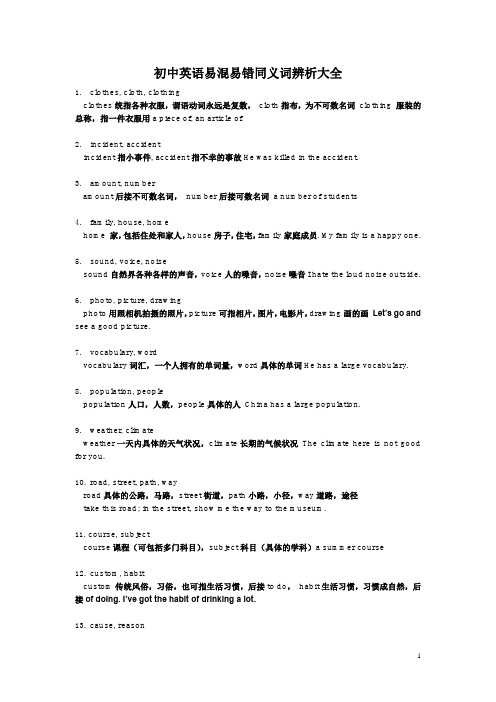
初中英语易混易错同义词辨析大全1.clothes, cloth, clothingclothes统指各种衣服,谓语动词永远是复数,cloth指布,为不可数名词clothing 服装的总称,指一件衣服用a piece of, an article of2.incident, accidentincident指小事件, accident指不幸的事故He was killed in the accident.3.amount, numberamount后接不可数名词,number后接可数名词a number of students4.family, house, homehome 家,包括住处和家人,house房子,住宅,family家庭成员. My family is a happy one.5.sound, voice, noisesound自然界各种各样的声音,voice人的嗓音,noise噪音I hate the loud noise outside.6.photo, picture, drawingphoto用照相机拍摄的照片,picture可指相片,图片,电影片,drawing画的画Let’s go and see a good picture.7.vocabulary, wordvocabulary词汇,一个人拥有的单词量,word具体的单词He has a large vocabulary.8.population, peoplepopulation人口,人数,people具体的人China has a large population.9.weather, climateweather一天内具体的天气状况,climate长期的气候状况The climate here is not good for you.10.road, street, path, wayroad具体的公路,马路,street街道,path小路,小径,way道路,途径take this road; in the street, show me the way to the museum.11. course, subjectcourse课程(可包括多门科目),subject科目(具体的学科)a summer course12.custom, habitcustom传统风俗,习俗,也可指生活习惯,后接to do,habit生活习惯,习惯成自然,后接of doing. I’ve got the habit of drinking a lot.13.cause, reasoncause 指造成某一事实或现象的直接原因,后接of sth./doing sth,reason用来解释某种现象或结果的理由,后接for sth./doing sth. the reason for being late14.exercise, exercises, practiceexercise运动,锻炼(不可数),exercises练习(可数),practice(反复做的)练习Practice makes perfect.15.class, lesson作"课"解时,两者可以替换.指课文用lesson. 指班级或全体学生用class. lesson 6; class 516. speech, talk, lecturespeech指在公共场所所做的经过准备的较正式的演说,talk日常生活中的一般的谈话,讲话,lecture学术性的演讲,讲课a series of lecture on…17.officer, officialofficer部队的军官,official政府官员an army officer18.work, job二者均指工作。
初中英语语法——易混动词用法辨析

初中英语语法——易混动词用法辨析1.agree with,agree to和agree on*agree with...指“同意某人或某人的意见、观点、决定、方法、安排、说明”等,其后能够是一个名词,也能够是what引起的从句。
如:I don’t agree with you.I don’t agree with what you said.*agree to...是指“同意某打算、建议、或建议”等;后跟动词原形,意为“同意干某事”。
如:Who else will agree to this suggestion besides him?We agreed to start early.*agree on...指在某方面取得一致的看法或意见。
如:We agree on leaving for Beijing the next day.2.answer和reply*answer是常用词,可指口头、笔头,甚至行动回答,有时可与reply 通用。
如:Who can answer the question?Please answer the telephone.*reply较answer正式,既可指用语言、书面作答,也可指用动作或手势作答,常用于正式场合或书面语中,指通过慎重考虑作出的答复。
如:I sent in my application,and the school replied immediately.3.apologize to和apologize for*apologize to sb.相当于say sorry to sb. 表示“向某人道歉”。
如:You should apologize to the old man.*apologize for sb.意为“替某人道歉或认错”。
如:4.argue about和argue with*argue about指“为某事而争辩、争吵”。
如:Don’t argue about the matter any more.*argue with指“为某人争吵、争辩或吵架”。
初中英语常考易混介词用法辨析
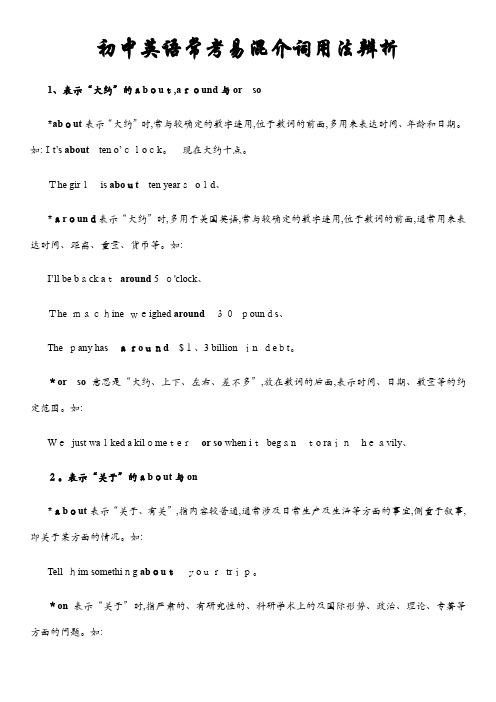
初中英语常考易混介词用法辨析1、表示“大约”的about,around与or so*about表示“大约”时,常与较确定的数字连用,位于数词的前面,多用来表达时间、年龄和日期。
如:It’s about ten o’clock。
现在大约十点。
The girlis about ten yearsold、*around表示“大约”时,多用于美国英语,常与较确定的数字连用,位于数词的前面,通常用来表达时间、距离、重量、货币等。
如:I’ll be back ataround 5 o'clock、The machine weighed around30pounds、The pany hasaround$1、3 billion in debt。
*or so意思是“大约、上下、左右、差不多”,放在数词的后面,表示时间、日期、数量等的约定范围。
如:Wejust walked a kilometeror so when itbeganto rainheavily、2。
表示“关于”的about与on*about表示“关于、有关”,指内容较普通,通常涉及日常生产及生活等方面的事宜,侧重于叙事,即关于某方面的情况。
如:Tell him something aboutyourtrip。
*on表示“关于”时,指严肃的、有研究性的、科研学术上的及国际形势、政治、理论、专著等方面的问题。
如:This is a book onradio、Nextwe’ll havealesson onhistory、3。
表示“在、、、、、、上"的above,over与on*above表示“在、。
、、、的上方”,指某物的位置高出某一物体或另一位置,两物之间不接触,反义词是below。
如:The plane isflying abovethe clouds。
*over表示“在、。
、、的正上方",侧重两物体间的垂直高度,此外还有覆盖在上面的意思,其反义词是under、如:The lamphung overthetable。
初中英语易混动词辨析

易混动词及短语动词1.beat和win的区别beat表示“打败”,后面跟的宾语是对手;win表示“赢得”,后面跟比赛或活动等作宾语。
如:They beat the Giants by a score of 7 to 3. 他们以7比3战胜了巨人队。
Though it was not easy, they won the game at last. 虽然不容易,他们最后还是赢了比赛。
2.carry, take与bring的区别take是指将某物或某人从这里“带到”或“拿到”某处。
bring与take相反,是指将某物或某人从别处“带来”或“拿来”。
carry是指随身携带(背着、扛着、提着、抱着),不表明来去的方向。
fetch常指从说话地到另外一个地店,取回某物。
如:Please help me take it to the classroom. 请帮我把它拿到教室去。
May I bring Tom to see you next Monday? 我下周一能带Tom来见你吗?The box is heavy. Can you carry it? 这个盒子太重了,你能拿得起来吗?Fetch a glass of water for me, please. 请给我拿杯水来。
3.cross和across的区别cross与across都表示“穿过;横过"的意思。
但是cross 是及物动词,across是介词,across 是前面必须还要有谓语动词。
如:Is it safe to cross the road now? 现在过马路安全吗?Go across the bridge. You'll find the museum on the left. 走过这座桥,你就会在左边找到那个博物馆。
4.hear与listen to的区别动词hear与listen to之间的区别,同see与look at之间的区别非常相似。
初中英语备考-常用易混易错的单词和词组的区别用法、易错句型及短语梳理
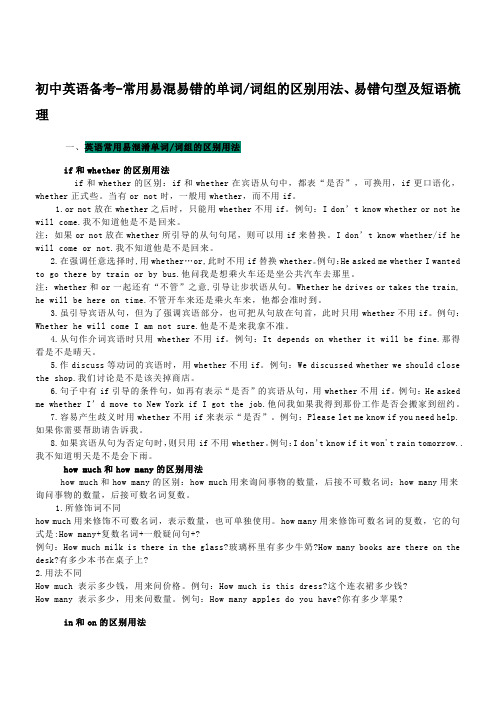
初中英语备考-常用易混易错的单词/词组的区别用法、易错句型及短语梳理一、英语常用易混淆单词/词组的区别用法if和whether的区别用法if和whether的区别:if和whether在宾语从句中,都表“是否”,可换用,if更口语化,whether正式些。
当有or not时,一般用whether,而不用if。
1.or not放在whether之后时,只能用whether不用if。
例句:I don’t know whether or not he will come.我不知道他是不是回来。
注:如果or not放在whether所引导的从句句尾,则可以用if来替换。
I don’t know whether/if he will come or not.我不知道他是不是回来。
2.在强调任意选择时,用whether…or,此时不用if替换whether。
例句:He asked me whether I wanted to go there by train or by bus.他问我是想乘火车还是坐公共汽车去那里。
注:whether和or一起还有“不管”之意,引导让步状语从句。
Whether he drives or takes the train, he will be here on time.不管开车来还是乘火车来,他都会准时到。
3.虽引导宾语从句,但为了强调宾语部分,也可把从句放在句首,此时只用whether不用if。
例句:Whether he will come I am not sure.他是不是来我拿不准。
4.从句作介词宾语时只用whether不用if。
例句:It depends on whether it will be fine.那得看是不是晴天。
5.作discuss等动词的宾语时,用whether不用if。
例句:We discussed whether we should close the shop.我们讨论是不是该关掉商店。
- 1、下载文档前请自行甄别文档内容的完整性,平台不提供额外的编辑、内容补充、找答案等附加服务。
- 2、"仅部分预览"的文档,不可在线预览部分如存在完整性等问题,可反馈申请退款(可完整预览的文档不适用该条件!)。
- 3、如文档侵犯您的权益,请联系客服反馈,我们会尽快为您处理(人工客服工作时间:9:00-18:30)。
初中英语常见常考易混词用法辨析七年级1 besides ,except, except for,but(1)besides包括后面所提及的人或物在内,“除、、、之外还(又)”。
Twenty-five students went to the cinema besides him。
(2)except不包括后面所提及的人或物在内,“抛开、、、不谈".Twenty—five students went to the cinema except him。
(3)except for不包括后面所提及的人或物在内的“除了”,后面跟的词与句子的主语不属于同类.Your article is very good except for some mistakes。
(4)but常与every,any,all,none,no以及它们与thing ,body,where构成的复合词等连用。
有的已经成为了惯用语,如:all but“几乎,除、、、之外全部”,anything but “除、、、之外都”,nothing but“只不过是、、、"。
There is nothing but a cup on the table.练习:1)All the questions are easy _________the last one.2)Do you think of nothing_____________watching football?3)His composition is good __________for some mistakes。
4)He has many relatives_____________his uncle living in Shanghai.5)Do you know any other language__________English?2 reach , arrive in/at ,get to(1)reach +地点,“到达"。
(2)arrive in+大地方,arrive at+小地方,“抵达、达到某地(尤指行程的终点)"。
(3)get to+地点,“到达"。
(4)当arrive in/at和get to后面跟的是地点副词here,there,home等,则省略介词in/at/to。
(5)当只表明“到了”,而未表明地点时用arrive。
练习:1)My sister________school at 7a.m every day.2)Uncle Li __________New York the day before yesterday。
3)You can___________the railway station by bus。
4)My father_________at 8:00 this morning by airplane.5)How did you______________home yesterday afternoon?6)Do you how to___________there ?7)I will tel you how to ____________here,so d not worry。
3 at the end of , in the end , by the end of(1)at the end of 指某段时间的结束或某段路程的终止处,“在、、、结束时”,“在、、、尽头”。
Our school held a sports meeting at the end of last term。
At the end of this street you will find a bookshop.(2)in the end 相当于at last ,finally,“最后,终于".In the end they caught the thief。
(3)by the end of 用于过去完成时或将来时,“到、、、末为止”。
By the end of last term we have learned five English songs.This question will have been answered by the end of today.练习:1)We will have an English exam _________________January.2)I am sure everything will turn out satisfactory_______________.3)________________the meeting,everyone stood up to give the applause.4)______________last month, I had planted thousands f trees。
4 it , one, that(1)it 代替上文所提到的那个事物,一般指物,不指人.可以代替单数可数名词或不可数名词。
复数形式是they或them。
I have 50 yuan. My uncle gave it to me last week.(2)one 代替上文出现过的单数名词,以免重复。
泛指代人或物.所指代的人或物属于同类事物中不同的一个,即替代的是一个带有不定冠词的可数名词的单数形式。
复数形式是ones.I have lost my old watch。
This is a new one。
(3)that 代替前面同类不同一的事物。
可以代替单数可数名词或不可数名词.代替可数名词时,复数形式是those。
that不可以替代表示人的名词,它可以根据语义在后面加上一些定语,多数是of的短语;他的前面不能存在任何定语。
The water in wells is cleaner than that in the rivers。
练习:1)Do you need an English—Chinese dictionary ? I have__________。
2)The language used in advertisements differs from __________ used in ordinary readings.3)The color of the jacket is better than__________of mine。
4)I saw only one motorcar in the shop。
Would you go and buy__________?5)Maybe it is true that we do not know what we have got until we lose _________.5 look for, look up , find , find out(1)look for“寻找”,强调找的过程.(2)Look up “查找",强调查字典、电话号码.(3)Find“找到,发现”,强调找的结果。
(4)Find out“查明,发现,了解”,指的是经过认真观察、调查或研究把某事或某物查出来、搞清楚,多用于复杂而不容易直接查出的情况。
练习:1)I’m__________my watch,but I can’t________it。
2)If you do not know the words , you can__________them _________in the dictionary.3)I__________it difficult to learn English well。
4)The teacher wanted to __________who had broken the door.6 as well,as well as(1)as well 相当于also,too“也,又”.常放在句子末尾,无需用逗号与句子分开。
I am going to London and my sister is going as well.(2)as well as “也,还”.常用来连接两个并列的成分。
连接连个并列的主语时,谓语动词与前面的主语保持一致;翻译时先翻译后面,在翻译前面。
Your wife as well as you is friendly to me。
练习:1)The teachers _____________the students are working overtime。
2)They played all kinds of instruments and sang___________.7 rather than , instead of ,in place of(1)rather than和would连用时构成would rather。
than...“宁愿、、、而不愿、、、”的句式,表示主观愿望,在两者中择一。
She would rather die than lose her children。
rather than不和would连用时,表示客观事实,“是、、、而不是、、、;与其、、、不如、、、”。
它的并列成分可以是名词,代词,形容词,介词(短语),动名词,分句,不定式,动词等等。
Rather than连接两个主语时,谓语动词应该和前面的主语保持一致.Rather than连接两个不定式时,不定式可以带to,也可以不带to.He is an explorer rather than a sailor。
You rather than I are going to go camping.I decided to write rather than (to)telephone.(2)instead of “代替”,“做、、、而不做、、、”.My parents just called me.I’m afraid I have to have dinner with them instead of shopping with you tonight。
(3)in place of “代替".着重强调一种物质替换另一种物质。
Plastics are now often used in place of wood or metal.练习:1)He ran ___________walked。
2)_______________making progress,my work actually seems to be going backwards.3)William talked at the meeting ____________the manager who was sick。
